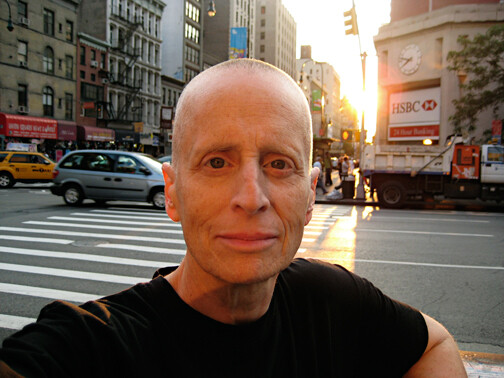The Electronic Intifada 4 December 2014

Leslie Feinberg (Leslie Feinberg/Flickr)
Over the course of Leslie’s life, ze was active in anti-war mobilization, in organizing against queer and/or trans criminalization and Palestinian solidarity. Leslie’s legacy of resistance is crucial in our time of “post” racial anti-Blackness and neoliberalism in which gay is figured as “the new black” and the police and prisons are seen not as “the real enemy,” as Sylvia Rivera called them, but rather our imagined friends.
This is seen through the hailing of US anti-hate crime legislation such as the Matthew Shepard and James Byrd Jr. Hate Crimes Prevention Act of 2010 — which was in fact an amendment to the National Defense Authorization Act that increased the US military budget to its highest level in history. Today, the prison and military industrial complexes are figured as necessary institutions securing the American neoliberal scene and providing a safe haven for “diversity” through the enforcement of “hate crime” legislation and queer and (and now, aiming for trans) military inclusion.
It is rather convenient for queer and/or trans counter hirstory to be erased, depoliticized and co-opted. Yet, Leslie Feinberg’s work resists neoliberal depoliticization and instead forces a reckoning with histories of Black radicalism, Palestine solidarity and the legacies of revolutionary trans women of color like Sylvia Rivera. As Leslie stated: “wherever racism rears its ugly head, our movement must be there.” And Leslie meant it and was always there — present in solidarity against trans misogyny, Islamophobia, white supremacy, the silencing of the AIDS epidemic, Israeli apartheid and US imperialism.
Weaponizing queerness
Leslie’s writing, which spanned the conventions of genre (from journalism, to nonfiction and fiction) was part of an epistemic battle against historical erasure of queer and/or trans people, especially poor and of color, from the past of left movements, AIDS activism and anti-imperialist struggle. Leslie marshaled the power of what scholar José Muñoz called “the performative force of the past” in hir nonfiction writing, whether it was interviewing Sylvia Rivera of Street Transvestite Action Revolutionaries, or writing about Kiyoshi Kuromiya, Ortez Alderson and other queer of color anti-war turned AIDS activists.
Leslie showed how queer and transness are weaponized as part of settler colonial logics and imperialist ventures. In hir speech at the 2007 ASWAT conference, Leslie stated: “Today we see how the imperialists — the US to Israelis — use the experiences of women, of gays, of transgenders as pretexts for imperialist war. The white supremacist ideology replaces the colonial claim of ‘bringing civilization, into imperialist claims that they are ‘bringing democracy.’”
Leslie also pointed out the ways in which the criminalization of gender and sexuality are inseparable from the broader history of coloniality: “The British Mandate brought anti-sodomy laws to Palestine, a legacy the Israeli occupation kept.” Contrary to the common sense of white settler colonial sexuality and its racist and imperialist logics, Leslie emphasized that “sexuality, gender expression and bodies” cannot be “liberated without making a ferocious mobilization against imperialist war and racism an integral part of our struggle.”
Palestine solidarity
In our current neoliberal moment of pinkwashing, Israel is figured as a site of queer modernity and the Middle East and North Africa, in typical Orientalizing and anti-black fashion, is figured as backwards, uncivilized and outside the temporal and spatial coordinates of Western modernity. Meanwhile, students at historically Black colleges and universities in the US are being courted by the Israel lobby giant AIPAC.
Leslie’s critiques of settler colonialism are therefore all the more relevant. Leslie understood that the Palestinian struggle was not singular but rather attached to a wide history of anti-colonial resistance that continues today across the globe: “The Palestinian liberation movement is an anticolonial movement.” In Transgender Warriors Leslie showed the continuities of settler colonialism across space and time and offered historical comparisons between the occupation of Palestine and occupation of Native lands which was contingent upon the genocidal project of the formation of the settler colonial United States.
Leslie’s critiques were critiques in the sense that Edward Said conceptualized the anti-authoritarian role of critique. Said saw the liberatory potential in and of critique: “Criticism must think of itself as life-enhancing and constitutively opposed to every form of tyranny, domination and abuse; its social goals are noncoercive knowledge produced in the interests of human freedom.” Leslie’s work was life-enhancing, always working to radically reconstruct the world into one that we can all inhabit.
Tearing down walls
In Transgender Warriors Leslie describes being at a Palestine solidarity rally in the early 1970s and seeing signs protesting the massacre at Attica prison as well as the Vietnam war: “One banner particularly haunted me: it read Stop the War Against Black America, which made me realize it wasn’t just distant wars that needed opposing.”
Leslie saw the connection between domestic racialized warfare in America and US warfare abroad. The linkages between the war on Black and Palestinian life still persist in our time of the afterlife of slavery and the afterlife of the Nakba. In the United States police kill Black “citizens” with impunity — as in the tragic murders of Mike Brown and Eric Garner — Palestinians are criminalized — as in the targeting of Rasmea Odeh — and the two settler states forge relationships of securitization — as in the NYPD in Israel and Israeli and US sharing of carceral technologies and methodologies.
Sometimes walls — both metaphysical and real as in the wall of anti-black racism, the apartheid wall, the border wall, the prison wall — can seem so insurmountable and naturalized that we forget that they are historically constructed and so, can be torn down. Leslie’s revolutionary trans politics and passion reminds us, as do the liberatory poetics of Assata Shakur, Mahmoud Darwish and Samih al-Qasim, that walls can and must come down.
Che Gossett is a Black trans femme archivist and activist who works to excavate queer of color AIDS activist and trans archives. They are the recipient of the 2014 Gloria E. Anzaldúa Award from the American Studies Association Women’s Committee, a Radcliffe research grant from Harvard University and the 2014 Sylvia Rivera Award in Transgender Studies from the Center for Gay and Lesbian Studies at the City University of New York. Che was a member of the 2013 Archivists and Librarians Delegation to Palestine. Che also was a presenter at the Black liberation workshop at the 2014 National Students for Justice in Palestine conference.


Comments
Leslie Feinberg and Sylvia Rivera
Permalink Marina Brown replied on
I have to say i miss both Leslie and Sylvia. During the 90's i often saw Leslie at national demonstrations against war and and racism. Leslie was a refreshing break from the Democratic Party politics that infests much of the gay establishment.
Around 1999 to about 2001 i helped STAR as their internet person. I have to say having the strong revolutionary socialist voice of Sylvia was a comfort. She would not be cowed by the police and she understood the true nature of imperialism.
Hi Marina, Thanks for sharing
Permalink Ali Abunimah replied on
Hi Marina, Thanks for sharing this. I first became aware of Leslie Feinberg when I heard hir speak at a conference at the University of Illinois in Chicago in the late 1990s. I never forgot Leslie’s sharp focus on issues of US imperialism that many other people did not want to talk about. This did not only include Palestine, but at the time the devastating, indeed murderous effect of US-instigated sanctions on Iraq, that were fully supported by the Clinton administration. Leslie was clearly ahead of hir time in making the kind of connections hir work makes. I hope that a new generation of scholars and activists will become familiar with Leslie’s work.
more!
Permalink caro replied on
thank you for writing this piece! it's so important to continue lifting up the truth in our communities resisting imperialism and neoliberalism. thank you for making all of these connections, and i want to read more from you!
thanks Marina for sharing
Permalink Che Gossett replied on
thanks Marina for sharing your remarkable and powerful experiences! I love this part: "Around 1999 to about 2001 i helped STAR as their internet person. I have to say having the strong revolutionary socialist voice of Sylvia was a comfort. She would not be cowed by the police and she understood the true nature of imperialism."
Leslie's speech in Palestine
Permalink Nadine replied on
Leslie's speech in Palestine in whch she both addresses her Palestinian solidarity and her support of the BDS campeign
https://www.youtube.com/watch?...
Thanks!
Permalink Che Gossett replied on
Thanks for sharing Nadine, the speech is also hyperlinked where its mentioned in the article as well! :)
it read Stop the War Against
Permalink Maaria replied on
it read Stop the War Against Black America, which made me realize it wasn’t just distant wars that needed opposing <a href="https://www.facebook.com/samso... World</a>